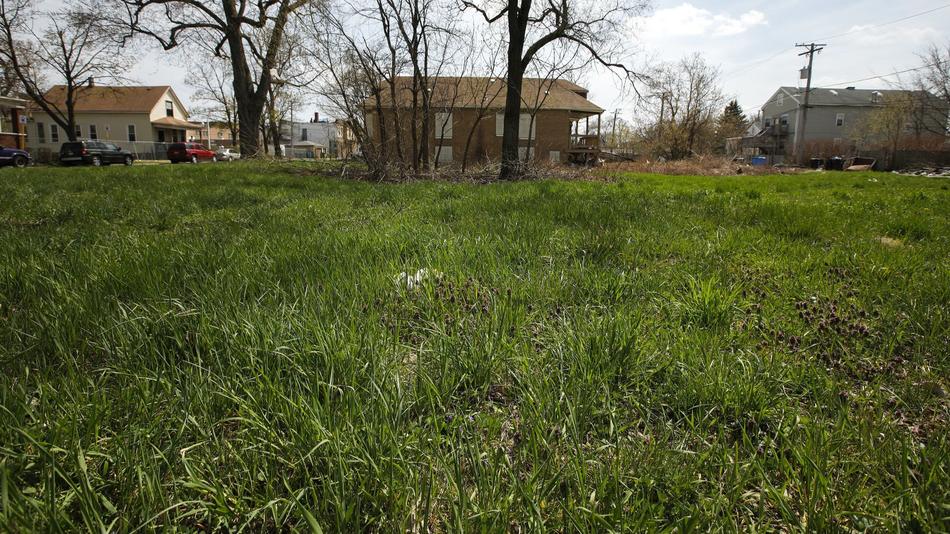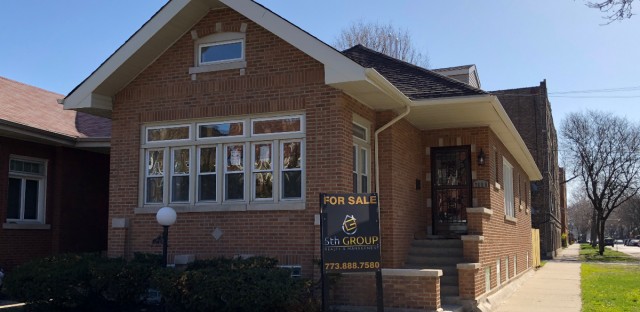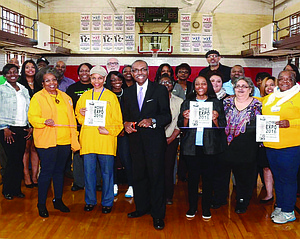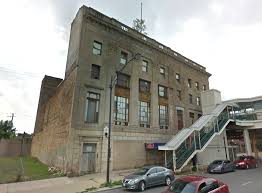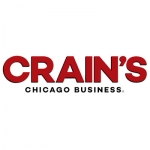Q&A with Executive Director Robert Rose of the Cook County Land Bank Authority
By TJ Armour, N’Digo | August 20th, 2018 (Click here for the original article)
Since its creation in 2013, the Cook County Land Bank Authorityhas worked hard to reverse the effects of the 2008 mortgage crisis by taking tax delinquent, vacant properties in south and west side neighborhoods and getting them back to a useful purpose. They’ve removed barriers that have existed for years in turning these properties around because they have the authority to quickly acquire them, eliminate all back taxes and fees associated with them and offer them to people in the community to purchase and rehab at below market to little cost.
A few of the CCLBA’s accomplishments thus far include: Rehab 500 homes that were once that vacant and tax delinquent, bringing down area home values and producing no tax revenue for local government services. These affordably priced homes are now in the hands of new homeowners or are in the process of being purchased. Generate nearly $33 million in new community wealth – i.e., home value for new homeowners. Be 100% self-funded with no taxpayer dollars used; generated $23 million in revenue through property sales and grants, which is being re-invested in acquiring new properties and to cover all operational expenses.
N’DIGO recently sat down with Executive Director Rob Rose to learn more about the organization and what else it has in store.
Q: Tell us a bit about your education and professional background?
I received my undergraduate degree in business from St. Edward’s University in Austin, TX. I received my MBA from The Johnson Graduate School of Management at Cornell University in Ithaca, NY. Pre-business school, I worked in the semiconductor and technology industry. Post-business school, my experience lies in real estate, banking, and community development.
Q: For those unfamiliar, what is the Cook County Land Bank Authority?
The Cook County Land Bank Authority (CCLBA) is a unit of Cook County government, funded primarily with revenues from property transactions. CCLBA is the largest land bank by geography in the country and is governed by a Board of Directors chaired by Cook County Commissioner Bridget Gainer. The Board of Directors is appointed by Cook County President Toni Preckwinkle and the Cook County Board of Commissioners.
Q: Please give a few examples of some of the projects to help transform communities that the CCLBA has been a part of?
One that immediately comes to mind is the Washington Park Bank Building located at 63rd and Cottage Grove. This building has been vacant for over 25 years. After acquiring the building, we engaged the Woodlawn community to determine future uses and incorporated those ideas into the Request for Proposal solicitation. We are currently working to identify a developer to rehab the Bank Building.
Q: In your opinion, what are some additional things our communities can do to keep the momentum going once people purchase the rehabbed properties?
Form or join the block club.
-
Get to know your neighbors.
-
Shop at local businesses.
-
Hold your elected officials accountable.
Q: How can those interested in being a part of the Cook County Land Bank Authority get involved?
Our website, www.cookcountylandbank.org, is a great place to start. The website has an interactive map to help people find and buy inventory. There islots of information on our programs, news stories and featured rehabs. People are also able to sign up to receive event notices and our newsletter. Of course, people are welcome to call us at 312-603-8015.
Q: What are three principles or ideals you try to abide by in your business dealings?
Integrity. Respect. Loyalty.
Q: Can you name a book that changed or really impacted your life?
Family Properties by Beryl Satter has really impacted my work. This book offers a poignant portrayal of how race transformed Chicago and other urban cities. The work of CCLBA is to fight against the effects of these race-driven policies in our communities.
Q: What’s something people would be surprised to know about you?
That I can be rather silly sometimes. Most people think I am very serious all the time.
Q: Best advice or words of wisdom aspiring business professionals?
Do what you love not just what you are good at.
Q: Favorite quote or affirmation?
“I can show you better than I can tell you”
“Treat others the way you want to be treated”
“I’d rather have it done right than to have it done fast”
Q: What’s next for Robert Rose and Cook County Land Bank Authority?
During my first three years, I worked to build a strong CCLBA team and execute a sound strategy for success. During the next three years, CCLBA is looking to ramp up activity to create more dynamic impact. We are expanding into acquiring larger, multifamily buildings as well more commercial and industrial properties. We are working on the policy front to expedite the acquisition of vacant property. We are continuing our work with the scavenger sale process.
For more information on the CCLBA, please visit www.cookcountylandbank.org
Cook County Selling Nearly 3,200 Vacant Lots to Encourage Redevelopment
By Corilyn Shropshire, Chicago Tribune | May 1st, 2018 (Click here for the original article)
Continuing its quest to spruce up city and suburban neighborhoods, the Cook County Land Bank is putting 3,189 vacant lots up for sale. The lots will be made available at below-market rates to individuals, developers and organizations. The land bank is hoping those who buy the properties will redevelop them in ways that meet community needs, by creating amenities like public gardens, play lots and basketball courts.
 Most of the vacant lots are in areas hit hard by the 2008 foreclosure crisis and are delinquent on taxes. Many of the 2,436 vacant lots in Chicago are on the South and West sides. The bulk of the properties are in East and West Englewood, according to land bank documents. The land bank also put 753 vacant lots in the suburbs up for sale, in communities such as Bellwood, Chicago Heights and Harvey, among others.
Most of the vacant lots are in areas hit hard by the 2008 foreclosure crisis and are delinquent on taxes. Many of the 2,436 vacant lots in Chicago are on the South and West sides. The bulk of the properties are in East and West Englewood, according to land bank documents. The land bank also put 753 vacant lots in the suburbs up for sale, in communities such as Bellwood, Chicago Heights and Harvey, among others.
The lots were acquired as part of the 2017 biannual Cook County tax scavenger sale. Because the land bank aims to have community members transform these lots to address community needs, in acquiring the properties it has the authority to clear back taxes and other related fees to help eliminate barriers to buying the properties.
As of Tuesday afternoon, the land bank had the tax certificates for 7,638 vacant lots, 739 residential properties and 306 industrial and commercial properties. The land bank acquires the tax certificates for the properties first, and then after a redemption period when the owner has a chance to pay the overdue taxes, the land bank can transfer the deed to a buyer. Vacant lots are often transferred within six months, and owners of tax delinquent buildings have 2½ years to pay the overdue amount before they lose the deed, according to Rob Rose, executive director of the land bank.
“In these neighborhoods, without this sort of intervention there is no market force that allows for a reset of these properties,” Rose said. “We have properties that are vacant and the tax burden is increasing every year and new taxes owed every year. The thing that makes them unattractive in the first place is the taxes are higher than the value of the property. At one point there’s never a way for these to be turned around. We are resetting these properties and allowing these neighborhoods to receive investment.”
The program is similar to the city’s Large Lots Program, which slashes red tape and encourages community members to buy vacant, blighted properties for just $1 and redevelop them.
Potential buyers of lots in Chicago are required to provide a letter of support from the local alderman if they don’t live in the same ward as the property. Buyers of suburban properties must have the support of the municipality if the purchaser is not local.
The land bank also is offering commercial and industrial properties.
The lots available for sale can be found at www.cookcountylandbank.org/taxcertificateprogram.
Banking On Development, Cook County to Sell ‘Scavenger’ Properties
By Becky Vevea, WBEZ Chicago | May 1st, 2018 (Click here for the audio clip)
More than 3,000 vacant, tax-delinquent properties across Cook County go up for sale Tuesday at below-market rates, as part of a government program to get blighted homes back on the tax rolls.
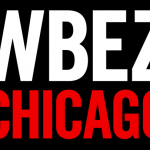 It’s the latest move by the Cook County Land Bank Authority, which was formed in 2013 after the housing crash to deal with the tide of newly vacant and abandoned properties in Chicago and the suburbs. Officials there are hoping the addition of the 3,189 vacant lots to the land bank’s portfolio will further help break a cycle of speculation and lead to new development in neighborhoods damaged by the housing crisis.
It’s the latest move by the Cook County Land Bank Authority, which was formed in 2013 after the housing crash to deal with the tide of newly vacant and abandoned properties in Chicago and the suburbs. Officials there are hoping the addition of the 3,189 vacant lots to the land bank’s portfolio will further help break a cycle of speculation and lead to new development in neighborhoods damaged by the housing crisis.
Each year, the county holds an annual tax sale, in which private buyers can pay off a property’s back taxes in exchange for being able to collect payments from the original owner, with interest. County officials say the problem with that system is that the people who buy the debt often just collect the interest alone, while the blighted properties remain untouched.
“Their intention, from our standpoint, is the role of a speculator,” said Rob Rose, executive director of the land bank. “They’re not really trying to use this as a tool for acquiring properties or redeveloping neighborhoods.”
By contrast, the new move by the land bank aims to take the properties that have been in that cycle the longest — known as “scavenger” properties — and get them rehabbed and back on the tax rolls, Rose said. Buyers who purchase property from the land bank will have the back taxes and other fees forgiven in exchange for promising to redevelop the land within a year.
With 3,189 new vacant lots released today, the total number of properties available for purchase through the land bank is 8,500. Most of the land bank’s inventory is in neighborhoods hit hard by the housing crisis.
“We’re taking a step to be able to offer even more properties to the neighborhoods,” Rose said.
As of last year, the land bank says it had sold 400 homes to developers and has spurred 500 rehabs. Officials estimate that activity has brought $4.3 million back on to the tax rolls. Last year, the land bank also started selling directly to homeowners and began acquiring commercial property.
14th Annual Free Citywide Expo Hosted in Tuley Park
By Katherine Newman | April 25, 2018 (Click here for the original article)
Chicago’s Chesterfield Community Council recently hosted their 14th annual free Citywide Home Expo at the Tuley Park Field House located on 90th St. and King Drive.
The Chesterfield Community Council is a community based non-profit organization that was started in 1955. The organization regularly organizes and participates in community activism along with hosting their annual Citywide Home Expo and the annual Silas Purnell College Expo.
 The free Home Expo was designed to bring Chicagoans together with all the housing-related resources that are available to them.
The free Home Expo was designed to bring Chicagoans together with all the housing-related resources that are available to them.
“The motivation to do the Home Expo was that we just started seeing a bunch of abandoned houses and a bunch of houses that were deteriorating in our communities and we couldn’t figure out why? We did further research and found out that some people were losing their homes to foreclosure and some of the homes that were dilapidated were just because people weren’t aware of some of the programs that were available for them,” said Eli Washington, chairman of the Chesterfield Community Council Board of Directors.
The one-day expo featured a basement flooding seminar moderated by Kari Steele from the Metropolitan Water Reclamation District. A Home Security Seminar presented by the Chicago Police Department and other home security professionals was also on the agenda. Additionally, Judge Freddrenna Lyle moderated a Foreclosure Prevention Seminar.
There was also information relating to home improvement programs, property tax relief, senior housing, homebuyer initiatives, senior homeowners programs, lawn care, gardening programs and qualified contractors were on site.
Three programs that were represented at the Home Expo that Washington believes are very valuable services included the weatherization program which helps people with heating and cooling issues. The Cook County Board of Review was also represented and provided onsite help with lowering property taxes. The Cook County Land Bank Authority, which works to reduce and return vacant land and abandoned buildings back to the community, also provided assistance.
“Cook County Land Bank Authority is one of the best programs in this county. They provide a whole host of homes that they will sell to you for little or nothing and most of these homes are in pretty good condition,” said Washington. “The county is not trying to make a profit on these homes. They just want to get the house back on the market which is admirable and this program has been really successful at turning a lot of these houses around.”
Other participants in the Home Expo included: Neighborhood Housing Services; Chicago Historic Bungalow Association; Peoples Gas; Com Ed; City of Chicago; the Cook County Assessor; Home Depot and Menards.
To explore the available properties from the Cook County Land Bank Authority, visit cookcountylandbank.org.
To learn more about the Chesterfield Community Council, visit their website at www.chesterfieldcommunitycouncil.org.
Banking On Development, Cook County to Sell ‘Scavenger’ Properties
By Becky Vevea, WBEZ Chicago | May 1st, 2018 (Click here for the audio clip)
More than 3,000 vacant, tax-delinquent properties across Cook County go up for sale Tuesday at below-market rates, as part of a government program to get blighted homes back on the tax rolls.
 It’s the latest move by the Cook County Land Bank Authority, which was formed in 2013 after the housing crash to deal with the tide of newly vacant and abandoned properties in Chicago and the suburbs. Officials there are hoping the addition of the 3,189 vacant lots to the land bank’s portfolio will further help break a cycle of speculation and lead to new development in neighborhoods damaged by the housing crisis.
It’s the latest move by the Cook County Land Bank Authority, which was formed in 2013 after the housing crash to deal with the tide of newly vacant and abandoned properties in Chicago and the suburbs. Officials there are hoping the addition of the 3,189 vacant lots to the land bank’s portfolio will further help break a cycle of speculation and lead to new development in neighborhoods damaged by the housing crisis.
Each year, the county holds an annual tax sale, in which private buyers can pay off a property’s back taxes in exchange for being able to collect payments from the original owner, with interest. County officials say the problem with that system is that the people who buy the debt often just collect the interest alone, while the blighted properties remain untouched.
“Their intention, from our standpoint, is the role of a speculator,” said Rob Rose, executive director of the land bank. “They’re not really trying to use this as a tool for acquiring properties or redeveloping neighborhoods.”
By contrast, the new move by the land bank aims to take the properties that have been in that cycle the longest — known as “scavenger” properties — and get them rehabbed and back on the tax rolls, Rose said. Buyers who purchase property from the land bank will have the back taxes and other fees forgiven in exchange for promising to redevelop the land within a year.
With 3,189 new vacant lots released today, the total number of properties available for purchase through the land bank is 8,500. Most of the land bank’s inventory is in neighborhoods hit hard by the housing crisis.
“We’re taking a step to be able to offer even more properties to the neighborhoods,” Rose said.
As of last year, the land bank says it had sold 400 homes to developers and has spurred 500 rehabs. Officials estimate that activity has brought $4.3 million back on to the tax rolls. Last year, the land bank also started selling directly to homeowners and began acquiring commercial property.


